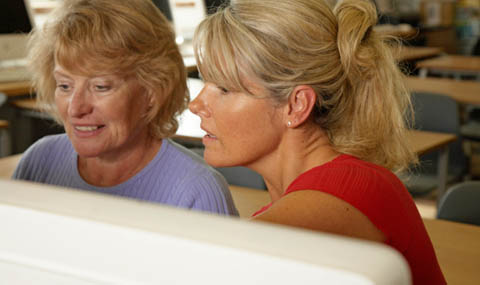Search the Blog
Categories
- Books & Reading
- Broadband Buzz
- Census
- Education & Training
- General
- Grants
- Information Resources
- Library Management
- Nebraska Center for the Book
- Nebraska Libraries on the Web
- Nebraska Memories
- Now hiring @ your library
- Preservation
- Pretty Sweet Tech
- Programming
- Public Library Boards of Trustees
- Public Relations
- Talking Book & Braille Service (TBBS)
- Technology
- Uncategorized
- What's Up Doc / Govdocs
- Youth Services
Archives
Subscribe
Category Archives: What’s Up Doc / Govdocs
Free Webinar! Serving Older Adults in a Changing World
 Date: November 8, 2016
Date: November 8, 2016
Time : 3:00-4:00 EST, 2:00-3:00 CST
With longer life expectancy and increasing diversity, older adults are reinventing aging and changing perceptions of their demographic. It’s time to rethink how our libraries serve this important and growing segment of our patron base. This webinar will focus on trends and impacts of the aging population, and will share creative strategies for library staff to meet the evolving needs of older adults in a changing world.
King County Library System was recently recognized by Urban Libraries Council as a 2016 Top Innovator for their work with older adults. Congratulations!
Presented by: Wendy Pender, Older Adults Project Specialist, King County Library System (WA)
Related Resources and Links:
- King County Library System’s 50+ page
- Pew Research on Older Adults
- National Council on Aging
- White House Conference on Aging
- Aging.gov
- Census.gov (Facts on older Americans)
Free Government e-Resources for Youth
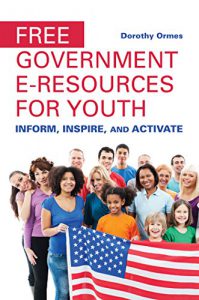 We have a new book in our collection here at the Nebraska Library Commission: Free Government e-Resources for Youth, by Dorothy Ormes. 146 p. Z688.G6 O76 2016
We have a new book in our collection here at the Nebraska Library Commission: Free Government e-Resources for Youth, by Dorothy Ormes. 146 p. Z688.G6 O76 2016
Specifically focusing on federal government resources available online, this book supports the education of young citizens and points to ideas for conducting programs for youth about the government.
Government documents offer a wealth of useful information that is often ignored or misinterpreted—even by librarians. And while improved search engines have improved access to online documents in recent years, patrons—especially young people—typically need help navigating and understanding the sites. Free Government e-Resources for Youth helps librarians promote online government information to youth and to assist youth in using it to become informed and educated about our federal government and how it works.
Author Dorothy Ormes—a Federal Depository Library Program librarian at Southern Oregon University—has created a guide to government resources that public and school librarians can use to support the education of young citizens. The book covers various areas of K–12 curriculum, highlighting activities and lesson plans based on national and state standards, and gives helpful directions for creating displays and conducting programs for youth on the government. The book also provides a brief explanation of the Federal Depository Library Program (FDLP) and describes how a public library can work with FDLP librarians or take advantage of an unprecedented opportunity to join the FDLP as active participants and benefit the community.
Features:
- Introduces librarians to a vast range of no-cost resources that can be added to their list of youth services, including reference, programming, and displays
- Helps librarians educate young people about their government and how it works
- Supports teachers and homeschoolers in K–12 education with a breadth of government resources available on a variety of subjects that are linked to national standards
If you would like to check out or reserve this book from our collection, please send us an email!
Star Net Eclipse Webinar Series
 Is Your Library Ready for the Astronomical Event of the Decade?
Is Your Library Ready for the Astronomical Event of the Decade?
Star Net is presenting a series of webinars in preparation for the solar eclipse next year.
Next Webinar: Wednesday, October 19th, 2016 at 11:00 am MT, 12:00 CT, 1:00 ET
On August 21, 2017, we will be treated to the first total eclipse of the Sun visible in the continental U.S. in almost 40 years. The spectacular total eclipse will only be visible in a narrow band about 60 miles across, stretching diagonally across the country from a beach in Oregon to a beach in South Carolina. However, everyone in North America will see a partial solar eclipse, where a big “bite” will be taken out of the Sun.
This will be the first major U.S. eclipse of the Internet age, and most people will need clear reliable information on when and how to observe the eclipse of the Sun safely. Astronomers are hoping libraries will play a key role in getting this information out to their communities. Working with astronomy groups in their communities, they could also be a central place for safe observing.
Get an early start in preparing for this eclipse, how to explain it, how to observe it safely, and what role libraries can play in organizing and informing their communities.
Join us for a 45 minute webinar where you’ll get great information about the eclipse, and be able to ask questions about the role your library can play. Hosts: Dennis Schatz (NSTA, Pacific Science Center), and Andrew Fraknoi (Foothill College; co-author of a new book on eclipse education). Click here for an Eclipse FAQ sheet.
To register, please click here. Password is “star”.
Information About Key Library Program Bill
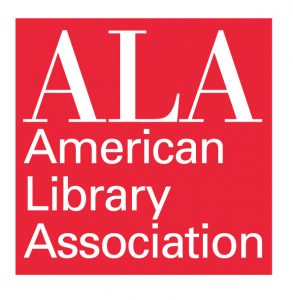 Every year, nearly $200 million in federal library funding is awarded to states by the Institute of Museum and Library Services (IMLS). IMLS can do that work, and gets the funding it needs, in no small measure because Congress passed and periodically “reauthorizes” the Museum and Library Services Act. It’s time for Congress to renew that important landmark legislation again and library champions in the Senate have just introduced a bill, S. 3391, to do exactly that.
Every year, nearly $200 million in federal library funding is awarded to states by the Institute of Museum and Library Services (IMLS). IMLS can do that work, and gets the funding it needs, in no small measure because Congress passed and periodically “reauthorizes” the Museum and Library Services Act. It’s time for Congress to renew that important landmark legislation again and library champions in the Senate have just introduced a bill, S. 3391, to do exactly that.
S. 3391 – Museum and Library Services Act of 2016
Synopsis of the bill:
- S. 3391 is a bi-partisan bill with broad support from the library and museum communities, and in Congress;
- S. 3391 requires the use of data driven tools, including research, analysis and modeling, evaluation, and dissemination to assess and assure the impact and effectiveness of funded programs;
- S. 3391 highlights the role of libraries as community hubs, equipped to meet ever evolving community needs, including: literacy, education, lifelong learning, workforce development, economic and business development, digital literacy skills critical thinking, financial literacy skills and new and emerging technology; and
S. 3391 will enhance IMLS’ collaborative efforts by expanding the number of federal agencies able to fully leverage the role of libraries and museums in supporting and meeting the needs of Americans.
October is Health Literacy Month
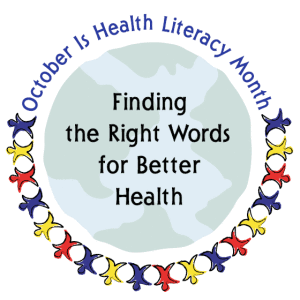 Discover ways your library can encourage health literacy in your community
Discover ways your library can encourage health literacy in your community
Health literacy is bigger than any one person, profession or program. It takes all of us working together to improve health understanding. That includes those who are working at, overseeing and visiting public libraries.
I have been focused on health literacy for many years, bringing to this field my experience as a clinician, training as an educator and perspective as a patient. From all these perspectives it is clear there is much work yet to do when it comes to clearly communicating about health. Your library can help. Here are some ways:
For those working at public libraries:
- You are at the very center of the intersection of health information and the public’s desire to learn. Your skills are key to helping patrons find relevant, readable, credible, up-to-date health resources. I hope your library offers an array of materials, including some that do not require a lot of reading or advanced computer skills. These can include resources such as videos, pictures, models and interactive games.
- You also might help patrons find the right words for health questions and searches. An example is helping patrons bridge the gap between complex, multisyllabic, technical terms (like “myocardial infarction”) with more common and simpler lay words (such as “heart attack”).
For those overseeing libraries:
- Ideally you already are, or soon will be, a “health literacy champion.” As a well-known and well-respected leader, you can help by introducing peers, staff and others to health literacy. Share credible data and compelling stories about why health literacy matters. Highlight how health literacy can help improve health outcomes and reduce medical costs when patients and their caregivers truly understand a new diagnosis, self-care plan and emergency instructions. You might also make clear potential costs to individuals and communities when this type of understanding does not occur.
- Consider joining or starting a regional coalition of health literacy advocates. This is a great way to broaden the message, perhaps by partnering with healthcare facilities, community services, local and state government, literacy programs, schools and business leaders. Decide what goals to address now, or later. One could be to host a Health Literacy Month event, teaching others about the value of health understanding.
For those visiting libraries:
- We likely all have had the experience of being a patient or caring for someone who is. Sometimes this experience can be frustrating, such as when a clinician uses unfamiliar, technical words and doesn’t take time to explain what those words mean. Happily, sometimes our healthcare experiences are good, like when a clinician shows (not just tells us) how to use a new medical device. Even better is when this clinician watches while we try using this device on our own. These experiences, both bad and good, can serve as important reminders about why health literacy matters.
- Learn ways to communicate clearly about your own health. One way is by bringing a list of questions to each medical appointment. Think ahead about which are most important. Along with my prioritized list, I bring a pen to write down the clinician’s answers. Another communication tip is to confirm you correctly understand directions. For instance, if the clinician says to take this new medicine with food, find out exactly what that means. Should you eat a big meal first and then take the pill? Or is it enough to nibble on a cracker when taking the medicine? I confirm directions by saying something to the clinician like, “I want to make sure I understood. When you said to take this medicine with food, does this mean that I should _____________?”
- Since this article is about public libraries, another tip is to learn all you want to know about your health situation. But please don’t feel like you have to study everything. A few years ago I was being treated for something serious (happily, I’m fine now). I surprised even myself by not wanting to read more about my diagnosis. But a friend dealt with her illness quite differently and every night found comfort in doing lots of research. My lesson learned is that there is no one “right” or “wrong” way when it comes to learning about health. And really, that’s fine.
Health Literacy Month is a time for organizations and individuals to promote the importance of understandable health information. This annual, worldwide, awareness-raising event has been going strong ever since Helen Osborne founded it in 1999. Health Literacy Month is now brought to you in collaboration with the Institute for Healthcare Advancement (IHA).
To learn more and for more health literacy resources for your library, go to www.healthliteracymonth.org.
Recognized as an expert in health literacy, Helen Osborne M.Ed., OTR/L, helps others communicate health information in ways that patients, caregivers and the public can understand. Osborne is president of Health Literacy Consulting, founder of Health Literacy Month and host of the podcast series “Health Literacy Out Loud.” Osborne is also author of the award-winning book Health Literacy from A to Z: Practical Ways to Communicate Your Health Message, Second Edition. To learn more about her work and background, go to www.healthliteracy.com.
Reprinted from WebJunction
Free Webinar! Teen Programming: A Mover & Shaker’s Recipe for Impact and Success
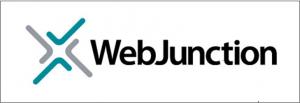 When “Change Agent” Courtney Saldana was featured as a 2016 Library Journal Mover & Shaker, we were treated to a sampling of her outstanding work with teens, and knew that all libraries could benefit from hearing more. Learn about her teen programming basics along with practical and actionable steps for doing a teen needs assessment, creating a teen space and hosting a teen book fest. Courtney will also introduce us to Skills for Teen Parenting (STeP), a program connecting teens with what they need to succeed as adults and parents: how to interview successfully, dress professionally, deal with conflict and time management, care for their child, postpone or prevent a second pregnancy, and more. Expanding from local success to state-wide implementation, the STeP program embodies a wonderful example of the replicable innovation brought to the field by Movers & Shakers.
When “Change Agent” Courtney Saldana was featured as a 2016 Library Journal Mover & Shaker, we were treated to a sampling of her outstanding work with teens, and knew that all libraries could benefit from hearing more. Learn about her teen programming basics along with practical and actionable steps for doing a teen needs assessment, creating a teen space and hosting a teen book fest. Courtney will also introduce us to Skills for Teen Parenting (STeP), a program connecting teens with what they need to succeed as adults and parents: how to interview successfully, dress professionally, deal with conflict and time management, care for their child, postpone or prevent a second pregnancy, and more. Expanding from local success to state-wide implementation, the STeP program embodies a wonderful example of the replicable innovation brought to the field by Movers & Shakers.
This webinar is part of a series highlighting the work of recent LJ Movers & Shakers and is hosted in collaboration with Library Journal.
Presented by: Courtney Saldana, Youth Services Supervising Librarian, Ontario City Library (CA)
Access Recording
- View Webinar Recording (You will be prompted to log in to our free Course Catalog.)
Webinar Attachments
- View slides (pdf)
- View chat (xls)
- View captions (txt)
- Learner Guide (doc) Use alone or with others to extend your learning.
Related Resources and Links
- 2016 Library Journal Movers & Shakers
- 2017 Library Journal Movers & Shakers Nomination Guidelines
- Courtney Saldana’s feature: 2016 Library Journal Mover & Shaker
- Buzzfeed: Extremely Upsetting Facts About The Class Of 2017
- Ontario City Library
- Teen Book Fest
- Infopeople webinar: Take the Next STeP: The STeP (Skills for Teen Parents) Project
- About Teen Advisory Groups on YALSA wiki
- On WebJunction: Young Adults & Teens
- School Library Journal article, New Teen Spaces from Coast to Coast
- Woodland Public Library (CA) STeP program overview
- School Library Journal article, To Support Teen Parents, Libraries Build Trust and Unique Programs
- Up next in the Movers & Shakers webinar series:
- Coming in December: Elizabeth Fitzgerald
- Coming in March: Erin Berman
- Shared in Chat:
- Franklin Public Library Teens, on Facebook (check out the photos!)
- Charleston Young Adult Book Festival – YALLFest
- Maricopa County Library District Librarycon
- Scottsdale (AZ) Public Library LibCon
- Abilene Public Library Lib-Con photos on Pinterest
- Project opportunity Small Libraries Create Smart Spaces
What’s Up Doc? New State Agency Publications Received at the Library Commission
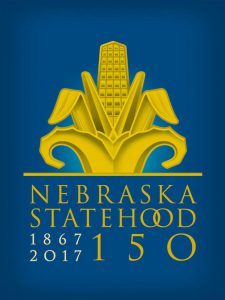 New state agency publications have been received at the Nebraska Library Commission for September 2016. Included are titles from the Nebraska Department of Correctional Services, the Nebraska Coordinating Commission for Postsecondary Education, the Nebraska Department of Roads, and the Nebraska Supreme Court, to name a few.
New state agency publications have been received at the Nebraska Library Commission for September 2016. Included are titles from the Nebraska Department of Correctional Services, the Nebraska Coordinating Commission for Postsecondary Education, the Nebraska Department of Roads, and the Nebraska Supreme Court, to name a few.
Free Webinar! New STAR_Net Resources for your Library
 Date: Wednesday, September 21
Date: Wednesday, September 21
Time: 1:00-1:30pm MDT (2:00-2:30 CDT, 3:00-3:30 EDT)
Join Anne Holland (Community Engagement Manager at the Space Science Institute) for a “Grand Opening” of the two new websites.
You’ll receive a tour of the new features and resources (available at www.starnetlibraries.org and clearinghouse.starnetlibraries.org) as well as have an opportunity to suggest new features and content.
You’ll also receive information on how to register your library for the 2017 Solar Eclipse, and get some free swag! We will keep this webinar to 30 minutes. See you there!
To register, please click here. Password is “star”.
What’s Up Doc? New State Agency Publications Received at the Library Commission
 New state agency publications have been received at the Nebraska Library Commission for August 2016. Included are titles from the Nebraska Department of Economic Development, the Nebraska Public Power District, The Nebraska State Historical Society, and the Nebraska Workers’ Compensation Court, to name a few.
New state agency publications have been received at the Nebraska Library Commission for August 2016. Included are titles from the Nebraska Department of Economic Development, the Nebraska Public Power District, The Nebraska State Historical Society, and the Nebraska Workers’ Compensation Court, to name a few.
Digitized and Free to Read Online : Archive of 6,000 Historical Children’s Books
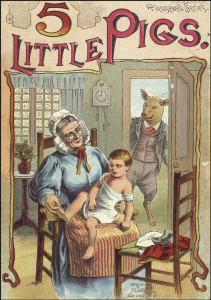 We can learn much about how a historical period viewed the abilities of its children by studying its children’s literature. Occupying a space somewhere between the purely didactic and the nonsensical, most children’s books published in the past few hundred years have attempted to find a line between the two poles, seeking a balance between entertainment and instruction. However, that line seems to move closer to one pole or another depending on the prevailing cultural sentiments of the time. And the very fact that children’s books were hardly published at all before the early 18th century tells us a lot about when and how modern ideas of childhood as a separate category of existence began.
We can learn much about how a historical period viewed the abilities of its children by studying its children’s literature. Occupying a space somewhere between the purely didactic and the nonsensical, most children’s books published in the past few hundred years have attempted to find a line between the two poles, seeking a balance between entertainment and instruction. However, that line seems to move closer to one pole or another depending on the prevailing cultural sentiments of the time. And the very fact that children’s books were hardly published at all before the early 18th century tells us a lot about when and how modern ideas of childhood as a separate category of existence began.
“By the end of the 18th century,” writes Newcastle University professor M.O. Grenby, 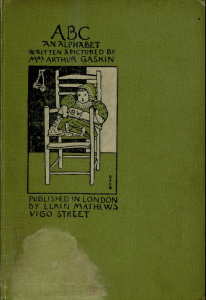 “children’s literature was a flourishing, separate and secure part of the publishing industry in Britain.” The trend accelerated rapidly and has never ceased—children’s and young adult books now drive sales in publishing (with 80% of YA books bought by grown-ups for themselves). Grenby notes that “the reasons for this sudden rise of children’s literature” and its rapid expansion into a booming market by the early 1800s “have never been fully explained.” We are free to speculate about the social and pedagogical winds that pushed this historical change.
“children’s literature was a flourishing, separate and secure part of the publishing industry in Britain.” The trend accelerated rapidly and has never ceased—children’s and young adult books now drive sales in publishing (with 80% of YA books bought by grown-ups for themselves). Grenby notes that “the reasons for this sudden rise of children’s literature” and its rapid expansion into a booming market by the early 1800s “have never been fully explained.” We are free to speculate about the social and pedagogical winds that pushed this historical change.
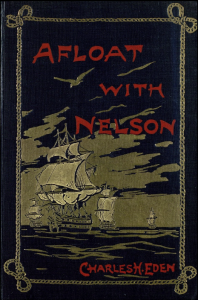 Or we might do so, at least, by examining the children’s literature of the Victorian era, perhaps the most innovative and diverse period for children’s literature thus far by the standards of the time. And we can do so most thoroughly by surveying the thousands of mid- to late 19th century titles at the University of Florida’s Baldwin Library of Historical Children’s Literature. Their digitized collection currently holds over 6,000 books free to read online from cover to cover, allowing you to get a sense of what adults in Britain and the U.S. wanted children to know and believe.
Or we might do so, at least, by examining the children’s literature of the Victorian era, perhaps the most innovative and diverse period for children’s literature thus far by the standards of the time. And we can do so most thoroughly by surveying the thousands of mid- to late 19th century titles at the University of Florida’s Baldwin Library of Historical Children’s Literature. Their digitized collection currently holds over 6,000 books free to read online from cover to cover, allowing you to get a sense of what adults in Britain and the U.S. wanted children to know and believe.
Several genres flourished at the time: religious instruction, naturally, but also language 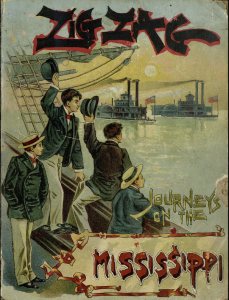 and spelling books, fairy tales, codes of conduct, and, especially, adventure stories—pre-Hardy Boys and Nancy Drew examples of what we would call young adult fiction, these published principally for boys. Adventure stories offered a (very colonialist) view of the wide world; in series like the Boston-published Zig Zag and English books like Afloat with Nelson, both from the 1890s, fact mingled with fiction, natural history and science with battle and travel accounts. But there is another distinctive strain in the children’s literature of the time, one which to us—but not necessarily to the Victorians—would seem contrary to the imperialist young adult novel.
and spelling books, fairy tales, codes of conduct, and, especially, adventure stories—pre-Hardy Boys and Nancy Drew examples of what we would call young adult fiction, these published principally for boys. Adventure stories offered a (very colonialist) view of the wide world; in series like the Boston-published Zig Zag and English books like Afloat with Nelson, both from the 1890s, fact mingled with fiction, natural history and science with battle and travel accounts. But there is another distinctive strain in the children’s literature of the time, one which to us—but not necessarily to the Victorians—would seem contrary to the imperialist young adult novel.
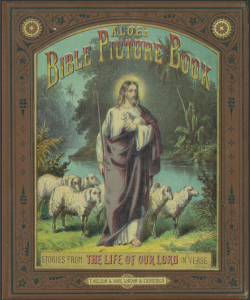 For most Victorian students and readers, poetry was a daily part of life, and it was a central instructional and storytelling form in children’s lit. The A.L.O.E.’s Bible Picture Book from 1871, above, presents “Stories from the Life of Our Lord in Verse,” written “simply for the Lord’s lambs, rhymes more readily than prose attracting the attention of children, and fastening themselves on their memories.” Children and adults regularly memorized poetry, after all. Yet after the explosion in children’s publishing the former readers were often given inferior examples of it. The author of the Bible Picture Book admits as much, begging the indulgence of older readers in the preface for “defects in my work,” given that “the verses were made for the pictures, not the pictures for the verses.”
For most Victorian students and readers, poetry was a daily part of life, and it was a central instructional and storytelling form in children’s lit. The A.L.O.E.’s Bible Picture Book from 1871, above, presents “Stories from the Life of Our Lord in Verse,” written “simply for the Lord’s lambs, rhymes more readily than prose attracting the attention of children, and fastening themselves on their memories.” Children and adults regularly memorized poetry, after all. Yet after the explosion in children’s publishing the former readers were often given inferior examples of it. The author of the Bible Picture Book admits as much, begging the indulgence of older readers in the preface for “defects in my work,” given that “the verses were made for the pictures, not the pictures for the verses.”
This is not an author, or perhaps a type of literature, one might suspect, that thinks highly 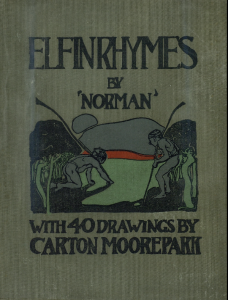 of children’s aesthetic sensibilities. We find precisely the opposite to be the case in the wonderful Elfin Rhymes from 1900, written by the mysterious “Norman” with “40 drawings by Carton Moorepark.” Whoever “Norman” may be (or why his one-word name appears in quotation marks), he gives his readers poems that might be mistaken at first glance for unpublished Christina Rossetti verses; and Mr. Moorepark’s illustrations rival those of the finest book illustrators of the time, presaging the high quality of Caldecott Medal-winning books of later decades. Elfin Rhymes seems like a rare oddity, likely published in a small print run; the care and attention of its layout and design shows a very high opinion of its readers’ imaginative capabilities.
of children’s aesthetic sensibilities. We find precisely the opposite to be the case in the wonderful Elfin Rhymes from 1900, written by the mysterious “Norman” with “40 drawings by Carton Moorepark.” Whoever “Norman” may be (or why his one-word name appears in quotation marks), he gives his readers poems that might be mistaken at first glance for unpublished Christina Rossetti verses; and Mr. Moorepark’s illustrations rival those of the finest book illustrators of the time, presaging the high quality of Caldecott Medal-winning books of later decades. Elfin Rhymes seems like a rare oddity, likely published in a small print run; the care and attention of its layout and design shows a very high opinion of its readers’ imaginative capabilities.
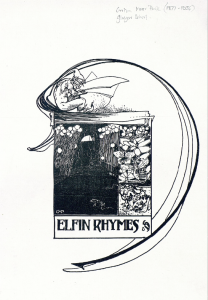 This title is representative of an emerging genre of late Victorian children’s literature, which still tended on the whole, as it does now, to fall into the trite and formulaic. Elfin Rhymes sits astride the fantasy boom at the turn of the century, heralded by hugely popular books like Frank L. Baum’s Wizard of Oz series and J.M. Barrie’s Peter Pan. These, the Harry Potters of their day, made millions of young people passionate readers of modern fairy tales, representing a slide even further away from the once quite narrow, “remorselessly instructional… or deeply pious” categories available in early writing for children, as Grenby points out.
This title is representative of an emerging genre of late Victorian children’s literature, which still tended on the whole, as it does now, to fall into the trite and formulaic. Elfin Rhymes sits astride the fantasy boom at the turn of the century, heralded by hugely popular books like Frank L. Baum’s Wizard of Oz series and J.M. Barrie’s Peter Pan. These, the Harry Potters of their day, made millions of young people passionate readers of modern fairy tales, representing a slide even further away from the once quite narrow, “remorselessly instructional… or deeply pious” categories available in early writing for children, as Grenby points out.
Where the boundaries for kids’ literature had once been 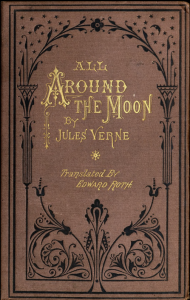 narrowly fixed by Latin grammar books and Pilgrim’s Progress, by the end of the 19th century, the influence of science fiction like Jules Verne’s, and of popular supernatural tales and poems, prepared the ground for comic books, YA dystopias, magician fiction, and dozens of other children’s literature genres we now take for granted, or—in increasingly large numbers—we buy to read for ourselves. Enter the Baldwin Library of Historical Children’s Literature here, where you can browse several categories, search for subjects, authors, titles, etc, see full-screen, zoomable images of book covers, download XML versions, and read all of the over 6,000 books in the collection with comfortable reader views. Find more classics in our collection, 800 Free eBooks for iPad, Kindle & Other Devices.
narrowly fixed by Latin grammar books and Pilgrim’s Progress, by the end of the 19th century, the influence of science fiction like Jules Verne’s, and of popular supernatural tales and poems, prepared the ground for comic books, YA dystopias, magician fiction, and dozens of other children’s literature genres we now take for granted, or—in increasingly large numbers—we buy to read for ourselves. Enter the Baldwin Library of Historical Children’s Literature here, where you can browse several categories, search for subjects, authors, titles, etc, see full-screen, zoomable images of book covers, download XML versions, and read all of the over 6,000 books in the collection with comfortable reader views. Find more classics in our collection, 800 Free eBooks for iPad, Kindle & Other Devices.
“Reprinted from Open Culture: The Best Free Cultural & Educational Media on the Web. Article by Josh Jones, August 30, 2016.”
Free Class: Health and Wellness @ the Library : The Essentials of Providing Consumer Health Services
 This fall you have two ways to take Health and Wellness @ the Library: The Essentials of Providing Consumer Health Services from NN/LM MCR staff.
This fall you have two ways to take Health and Wellness @ the Library: The Essentials of Providing Consumer Health Services from NN/LM MCR staff.
- 5 week online course for 12 MLA CE hours, September 7 – October 7, 2016
- 4 hour in-person NLA pre-conference for 4 MLA CE hours, October 19, 2016
Here’s the description for the NLA pre-conference:
Are you interested in starting or improving consumer health services in your library? Then this workshop is for you! We will define the core competencies of providing consumer health information services, and then dive directly into the essential skills and knowledge that library staff need to build those competencies. The class will begin with tools to learn the demographics and health status of people in your community. Together we will examine issues of literacy, health literacy, and the health information needs of special populations. From there we will explore authoritative resources for just about any type of health question, apps and mobile health technologies, how people are using social networking for health questions, and how to create fun and informative health-related programming for different populations in your community. Participants are encouraged to bring laptops or tablets for hands-on exercises. This course provides 4 CE credits towards the Consumer Health Information Specialization certificate.
For more information about the NLA pre-conference, visit http://www.nebraskalibraries.org/page/Neblib2016PreConf and look for “Health and Wellness @ the Library: The Essentials of Providing Consumer Health Services.” There is no additional registration fee for this pre-conference.
For more information about the 5 week online course, visit https://nnlm.gov/mcr/news_blog/2016/08/consumer-health-information-specializationmedical-library-association-ce-offering/. You do need to register, but there is no fee.
Christian Minter, christian.minter@unmc.edu
Annette Parde-Maass, AnnetteParde-Maass@creighton.edu
Education and Outreach Coordinators
National Network of Libraries of Medicine
Check out the Bringing Health Information to the Community (BHIC) Blog, http://nnlm.gov/bhic/
Free Webinar : Resources for Addressing Community Health Needs
 Resources for Addressing Community Health Needs
Resources for Addressing Community Health Needs
August 24, 2016 1:00 pm MT/ 2:00 pm CT, https://webmeeting.nih.gov/mcr2
Presenter: Dana Abbey, Community Engagement Coordinator, NN/LM MCR
There are numerous factors that have the potential to influence the health of your community members including quality of life, health behaviors, utilization of and access to health care, social and economic factors, and the physical environment.
In this hands-on session you will:
- Utilize tools for researching these factors at the local level.
- Identify authoritative health information resources for program planning.
- Identify potential community partners.
Who should attend?
- Public libraries and community organizations planning health outreach activities.
- K-12 staff involved in student health care and/or health and science curriculums (librarians, nurses, teachers).
- Public health grant writers.
- Anyone who interested in knowing about these great resources.
No registration is required. MLA CE credit is available upon completion of webinar evaluation.
Christian Minter, christian.minter@unmc.edu
Annette Parde-Maass, AnnetteParde-Maass@creighton.edu
Education and Outreach Coordinators
National Network of Libraries of Medicine,
Midcontinental Region
Check out the Bringing Health Information to the Community (BHIC) Blog, http://nnlm.gov/bhic/
National Library of Medicine New Director
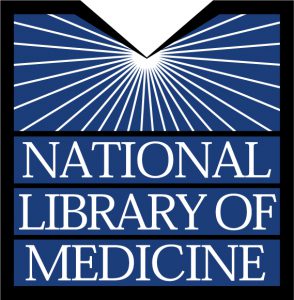 On September 12, 2016, Dr. Patricia Flatley Brennan will be sworn in as the new Director of the National Library of Medicine (NLM). You can read about Dr. Brennan’s credentials and accomplishments and watch a video about her vision for the NLM on the NLM in Focus blog. The 3-minute video highlights a number of roles the NLM plays in advancing health, many of which can be extrapolated to apply to local libraries as well. As Dr. Brennan states, “We’re going to have a new understanding of what is health…and the Library will be at the center of making sure that’s accessible and understandable.”
On September 12, 2016, Dr. Patricia Flatley Brennan will be sworn in as the new Director of the National Library of Medicine (NLM). You can read about Dr. Brennan’s credentials and accomplishments and watch a video about her vision for the NLM on the NLM in Focus blog. The 3-minute video highlights a number of roles the NLM plays in advancing health, many of which can be extrapolated to apply to local libraries as well. As Dr. Brennan states, “We’re going to have a new understanding of what is health…and the Library will be at the center of making sure that’s accessible and understandable.”
~Annette Parde-Maass
Education and Outreach Coordinator
National Network of Libraries of Medicine MidContinental Region
https://nnlm.gov/mcr
Get Your Library Ready for the Total Solar Eclipse — August 21, 2017
 Are you ready for the celestial event of the century? In just over a year from now (August 21, 2017), the shadow of the moon will sweep across the United States from the Pacific Ocean to the Atlantic Ocean in a spectacle that hasn’t occurred in 99 years! The National Center for Interactive Learning (NCIL) at the Space Science Institute has recently been awarded a grant for its NASA@ My Library program. Partners include NASA, ALA, The Girl Scouts, SETI, and many other organizations. The STAR Library Education Network (STAR_Net) is managed by NCIL. The STAR_Net team wants to work with your library and thousands of others to participate in this national event. Some fortunate libraries will be able to experience a total solar eclipse though every library in the country will observe at least a partial eclipse.
Are you ready for the celestial event of the century? In just over a year from now (August 21, 2017), the shadow of the moon will sweep across the United States from the Pacific Ocean to the Atlantic Ocean in a spectacle that hasn’t occurred in 99 years! The National Center for Interactive Learning (NCIL) at the Space Science Institute has recently been awarded a grant for its NASA@ My Library program. Partners include NASA, ALA, The Girl Scouts, SETI, and many other organizations. The STAR Library Education Network (STAR_Net) is managed by NCIL. The STAR_Net team wants to work with your library and thousands of others to participate in this national event. Some fortunate libraries will be able to experience a total solar eclipse though every library in the country will observe at least a partial eclipse.
So jump on the eclipse train!
Go to: Eclipse Registration to register your library.
We will, in turn, let you know how to access the following valuable resources:
· Vetted Multimedia for Programming/Promotion (Images, Video, Animations, Artwork)
· Media Template Package (Press Release, PSA, Community Letter, Media Alert)
· Private Eclipse Forum (registered libraries)
· Inclusion in Special Eclipse Promotions (Social Media, Blogs, Newsletters, etc.)
· Enrollment in STAR_Net’s Eclipse Newsletter
When your eclipse event is planned, you can share your press release, flyer, website link, or like material with us to receive 50 free Solar Shades for your patrons to watch along with us! (shades are available on a first come, first serve basis).
The STAR Library Education Network (STAR_Net) is supported by a grant from the National Science Foundation and other funders. STAR stands for Science-Technology Activities and Resources. This ground-breaking program includes a traveling STEM exhibition program, the development of STEM activities for public libraries, a comprehensive training program that includes in-person workshops and webinars, the development of the STAR_Net Online Community, and a research and evaluation program. STAR_Net is led by the Space Science Institute’s National Center for Interactive Learning. Partners include the American Library Association, Lunar and Planetary Institute, and the Afterschool Alliance along with many other organizations.
Posted in Books & Reading, Education & Training, General, Information Resources, Library Management, Programming, Uncategorized, What's Up Doc / Govdocs
Tagged 2017 Solar Eclipse Library Programing, free, Library Programing, Nebraska, public Library, Solar Eclipse, Total Eclipse 2017
Leave a comment
Moodle Course on Refugee Health — “From Beyond Our Borders: Providing Multilingual and Multicultural Health Information”
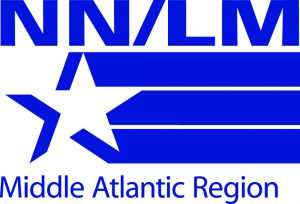 The (NN/LM), Middle Atlantic Region (MAR) invites you to this 3 week self-paced, asynchronous introduction to cultural competency, the unique health information needs of refugees and immigrants, and relevant health information resources:
The (NN/LM), Middle Atlantic Region (MAR) invites you to this 3 week self-paced, asynchronous introduction to cultural competency, the unique health information needs of refugees and immigrants, and relevant health information resources:
From Beyond Our Borders: Providing Multilingual and Multicultural Health Information
August 15th, 2016 – September 6th, 2016
This class is designed to assist librarians and others who work with diverse populations in locating health information. The resources presented are selected for their emphasis on providing culturally relevant information in the preferred language of the population. Background information on refugees and immigrants in the U.S. and their unique health issues will be presented. Participants will have the opportunity to become familiar with the features and scope of several Internet resources. The class will be taught via Moodle and includes short readings, videos, and activities.
This class has been approved for 4 hours of continuing education credits by the Medical Library Association for each part and is eligible for MLA Level I and Level II CHIS.
Register: https://nnlm.gov/ntc/classes/class_details.html?class_id=485
Course Contact: Kate Flewelling, NN/LM MAR
Regional Contact: Annette Parde-Maass, NN/LM MCR
Annette Parde-Maass
Education and Outreach Coordinator
National Network of Libraries of Medicine MidContinental Region
Creighton University Health Sciences Library
AnnetteParde-Maass@creighton.edu
402.280.4156
Check out the Bringing Health Information to the Community (BHIC) Blog, http://nnlm.gov/bhic/
What’s Up Doc? New State Agency Publications Received at the Library Commission
New state agency publications have been received at the Nebraska Library Commission for July 2016. Included are titles from the Nebraska Fire Marshal, the Nebraska Department of Labor, The Nebraska State Board of Geologists, and the Juvenile Justice system, to name a few.
Government Publication Resources in Languages Other Than English
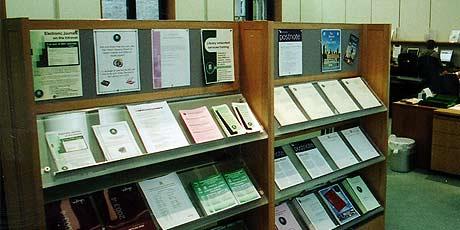 Do you have newly arrived immigrants or refugees in your community? Do you need to find government-published resources that might be helpful, especially in other languages?
Do you have newly arrived immigrants or refugees in your community? Do you need to find government-published resources that might be helpful, especially in other languages?
Following is a list of resources:
1. Search USA.GOV for Spanish Language Publications. You can change usa.gov to the Spanish language version: Gobierno.usa.gov
Or, link directly to the usa.gov consumer order site for free and low cost government publications. Scroll down under the categories tab and click on the red “español” button. Many of these publications are in pdf format for download. The section “programas federales” has a variety of social security brochures and 2 publications on immigration.
2. Also try Limited English Proficiency for multiple sources of information in other languages
3. Substance Abuse and Mental Health Services Administration — This is a link for ordering Spanish language mental health printed or .pdf publications from SAMHSA.
4. U.S. Citizenship and Immigration Services Foreign Language Resources Many different resources in a wide range of languages to choose from. There is also an excellent Citizenship Toolkit published by the GPO. Click on other languages for resources in Spanish and Chinese plus other languages.
5. Federal Trade Commission — Link to bulk order publications in Spanish from the FTC.
6. Link to consumer order site for free and low cost government publications. Scroll down under the categories tab and click on the red “español” button. Many of these publications are in pdf format for download. The section “programas federales” has a variety of social security brochures and 2 publications on immigration.
7. The entire CDC (Centers for Disease Control) site can be changed to Spanish and has excellent health information.
This is by no means a comprehensive list, but still lots of resources to get you started!
Free Webinar–Beyond the Job Description: Ten Practical Tips for the New Rural Library Director
 This webinar, presented in collaboration with ARSL, explores practical skills for new library directors serving a small or rural community.
This webinar, presented in collaboration with ARSL, explores practical skills for new library directors serving a small or rural community.
Date: August 11th, 2016
Time: 3:00 PM – 4:00 PM Eastern Time, 2:00-3:00 Central Time
On paper, your job description as a library director may not cover some of the unique challenges and opportunities that come with serving a small or rural community. Juggling the nuances of a new position can be overwhelming, but equipped with a tool belt of everyday skills ranging from assessment to communication and outreach to time-management, you can move through your new role with confidence. This session will be useful for anyone interested in strengthening their role in the library, even if you aren’t a director. Come learn from a successful new director, 10 fresh tips for working with staff, boards, and the community to create a strong and vibrant library. Join us and bring your tips and ideas to help new directors succeed!
This webinar is hosted in collaboration with the Association for Rural and Small Libraries.
Presenter: Jennifer Pearson, Director, Marshall County Memorial Library (TN) and current board member, ARSL
Federal Trade Commission Raises Awareness About Scams
 As part of their ongoing effort to raise awareness about scams targeting the Latino community, the Federal Trade Commission has developed a series of “fotonovelas” in Spanish. The stories are based on complaints to the FTC from Spanish speakers throughout the nation and offer practical tips to help detect and stop common scams. You can order copies of the Spanish-language fotonovelas — for free — and distribute them in your community. Here are some examples:
As part of their ongoing effort to raise awareness about scams targeting the Latino community, the Federal Trade Commission has developed a series of “fotonovelas” in Spanish. The stories are based on complaints to the FTC from Spanish speakers throughout the nation and offer practical tips to help detect and stop common scams. You can order copies of the Spanish-language fotonovelas — for free — and distribute them in your community. Here are some examples:
Fotonovelas
Maria and Rafael Learn the Signs of a Debt Relief Scam
This fotonovela alerts readers to the common signs of a debt relief scam and tells them where they can find legitimate credit counseling help.
Car-Buying Trouble
This fotonovela tells how to avoid trouble when you finance a new or used car through the dealership and where to report problems with dealer financing.
Notario scams
This fotonovela tells readers the warning signs of a notario scam, where to find help with the immigration process, and how to report scams to the Federal Trade Commission.
Debt Collectors
In this fotonovela, Juan learns his rights when dealing with debt collectors, where to go for information, and how to file a complaint.
Income Scam
This fotonovela alerts Latino consumers to the signs of an income scam, and provides advice to avoid falling for a scam.
Government Imposters
This fotonovela tells readers how to identity a government imposter and warns of the dangers of sending money to a stranger.
For more information, visit Fotonovelas at the Federal Trade Commission.
Nebraska DMV Announces Launch of Online Change-of-Address Service
 The Nebraska Department of Motor Vehicles (DMV) has launched a significant enhancement to an existing online service making it easier for Nebraskans to do business with the state of Nebraska. Holders of Nebraska driver’s licenses and IDs can now update their address online from their computer, tablet, or phone. In two weeks, 1,100 drivers have already used the application, reflecting unprecedented success.
The Nebraska Department of Motor Vehicles (DMV) has launched a significant enhancement to an existing online service making it easier for Nebraskans to do business with the state of Nebraska. Holders of Nebraska driver’s licenses and IDs can now update their address online from their computer, tablet, or phone. In two weeks, 1,100 drivers have already used the application, reflecting unprecedented success.
Launched on June 28, 2016, Nebraskans can comply with the statutory requirement to update their address within 60 days of moving. Using the new enhancement, they can provide the documents necessary to prove their address and circumvent the necessity to make a trip to a driver’s license office.
“We realize many of our customers want and need to do business with us outside of traditional business hours. We respect their time and were able remove this barrier to the online driver license renewal/replacement process,” stated DMV Director Rhonda Lahm. “This is one more way we can assist Nebraskans to interact with the DMV services they need in the most convenient manner possible.”
The Driver License Renewal/Replacement online application with the Change of Address capability can be found by going to http://www.clickDMV.nebraska.gov. Two types of documentation are required to prove an address; 14 different options exist. After documents are submitted, they are reviewed for approval by DMV driver licensing staff to approve valid documentation.
“This service will allow our customers who need a relatively simple transaction to get their business completed at a time which is convenient to them,” says Sara O’Rourke, Driver License Administrator for the DMV. “This accommodates the largest number of persons possible and promotes efficient use of our DMV services for our citizens.”
The online application was developed by Nebraska Interactive, LLC. “We are excited to add a new enhancement which saves constituents time and creates more effective and efficient government services,” stated Brent Hoffman, President of Nebraska Interactive.
Users can go to Nebraska.gov to find out more about online Government services in Nebraska.
